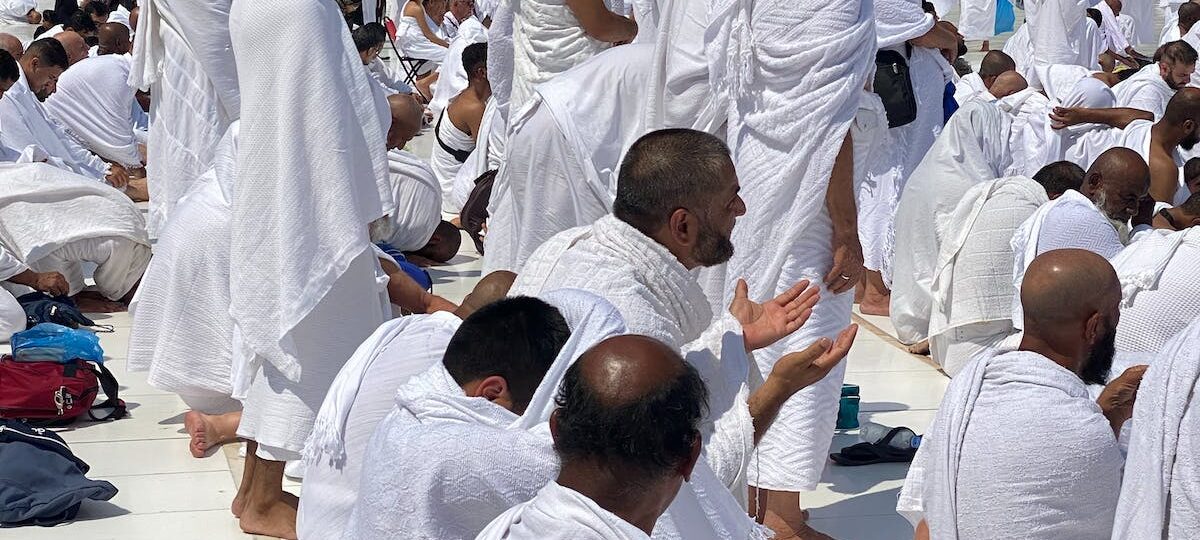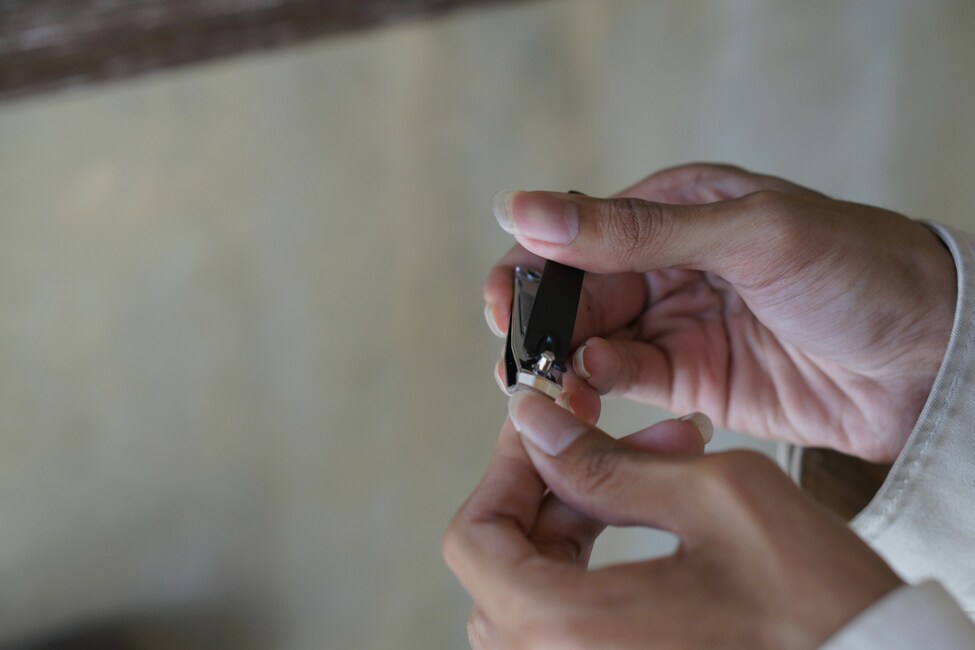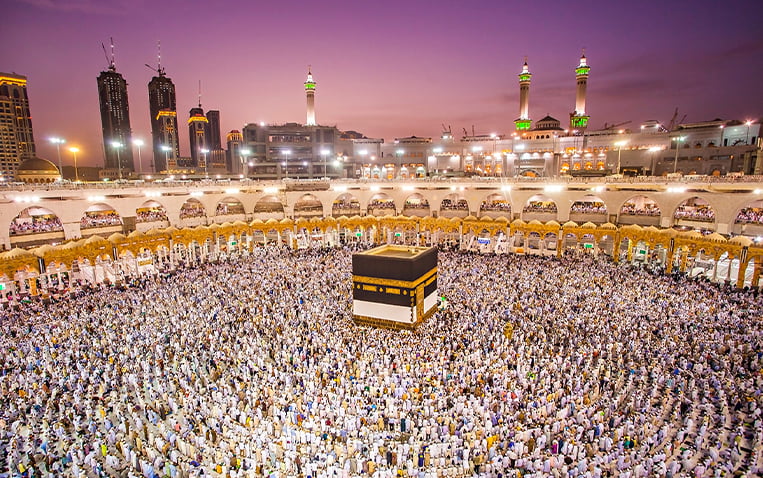The garment worn during the holy pilgrimages of Umrah and Hajj is called an ihram. Ihram basically means putting oneself under self-imposed restraints for one’s own health and purity. It imposes a number of prohibitions and is a necessary initiation for pilgrims starting their journey.
“Ihram” describes the modest white clothing that pilgrims wear on the Hajj or Umrah. Both men and women going on the pilgrimage must put on their Ihram clothing. During the pilgrimage rites, Muslim men and women must follow certain norms.
Prohibitions in Ihram Clothing
- Shaving Head or Cutting Hairs of Body
- Cutting Nails
- Using Perfume
- Sexual Activity
- Touching One’s Wife with Desire
- Killing or Hunting Game
- Wearing Sewn Garments by Men
- Niqabs Being Worn by Women
- Men to cover their head
- Looking in the Mirror for Self-Beautification
- Using Oil
- Using Swear Words
- Marriage Contract
1- Shaving Head or Cutting Hairs of Body
Pilgrims in the state of Ihram clothing are not allowed to shave or pluck any hair, whether it’s their own or someone else’s, regardless of whether the person is in Ihram clothing.
As Allah says in the Quran:
“Yet you shall not (ritually) shave your heads until the charitable offering reaches its destination (for sacrifice). As to whoever among you becomes sick or has an ailment of the head (that requires shaving,) then the due redemption is fasting, or (giving) charity, or a (charitable-offering of) sacrifice.” (Quran 2:196)
Shaving the head without a valid reason incurs a kaffarah(“atonement” or “expiation”) of a sheep. If done out of necessity, the penalty is a sheep, fasting for three days, or feeding six poor individuals. If a pilgrim in Ihram clothing involuntarily loses their hair during wudhu or ghusl, there’s no penalty. It’s also important to note that there is no penalty if a person shaves their head or cuts their hair for valid reasons, such as dealing with lice or a medical issue.
2- Cutting Nails
Clipping or extracting toenails and fingernails is usually forbidden. Trimming that particular area of the nail can provide relief if it gets blunt and causes irritation throughout the entire nail. If you have a significant problem, like a damaged nail, you can pull it out without getting in trouble.
One nail trim deserves 750 grams of food (mudd) in a kaffarah. A person who cuts all of their fingernails in one sitting must forfeit a sheep. The same holds for toenail cutting. The kaffarah is a sheep if the nails of both hands and feet are chopped together. The fine rises to two sheep, one for each session, if the nails on the hands and feet are cut differently.
3- Using Perfume
It is recommended that pilgrims apply Perfume (preferably attar) after bathing, but they should do so before formulating the intention or reciting the Talbiyah for Ihram clothing. Perfume use is prohibited after the Talbiyah. It is acceptable to bathe or wash your head, but scented soap is not advised.
Hazrat Ayesha (R.A) narrated that:
“I used to scent Allah’s Messenger (PBUH) whenever he wanted to assume Ihram and (also) on finishing ihram before circumambulating the House of Allah.” (Al-Bukhari and Muslim)
Another hadith that Al-Bukhari and Muslims narrated describes the Prophet (peace and blessings of Allah be upon him) telling a man wearing ihram clothing and smelling strongly of Perfume to wash the scent off his body three times.
4- Sexual Activity
A Muhrim, (someone who is in the holy state of Ihram clothing) must abstain from having sex. It negates a man’s Hajj if he has such contacts in Ihram clothing before the first release (before hurling stones at Jamrat Al-‘Aqabah). He still has to perform the remaining Hajj rituals.
He then must do Hajj again the following year, along with the camel or cow sacrifice. However, a Muhrim’s Hajj is still acceptable if he engages in sexual relations after the Ihram is first released (i.e., after tossing the pebbles at Jamrat Al-‘Aqabah). He has three options for making amends for the transgression: offering a sheep as a sacrifice, feeding six hungry people, or fasting for three days.
Moreover, masturbation by a pilgrim wearing the Ihram clothing is regarded as following the same regulations as sexual relations. This renders the Hajj void and requires the person to perform the remaining rituals if they happen prior to their stay in Muzdalifah. They then had to make the trek once more the following year. It is significant to remember that, as masturbation is known to be prohibited by Islamic law, people who engage in it should make an effort to stop, and those who do not should refrain from doing so.
5- Touching One’s Wife with Desire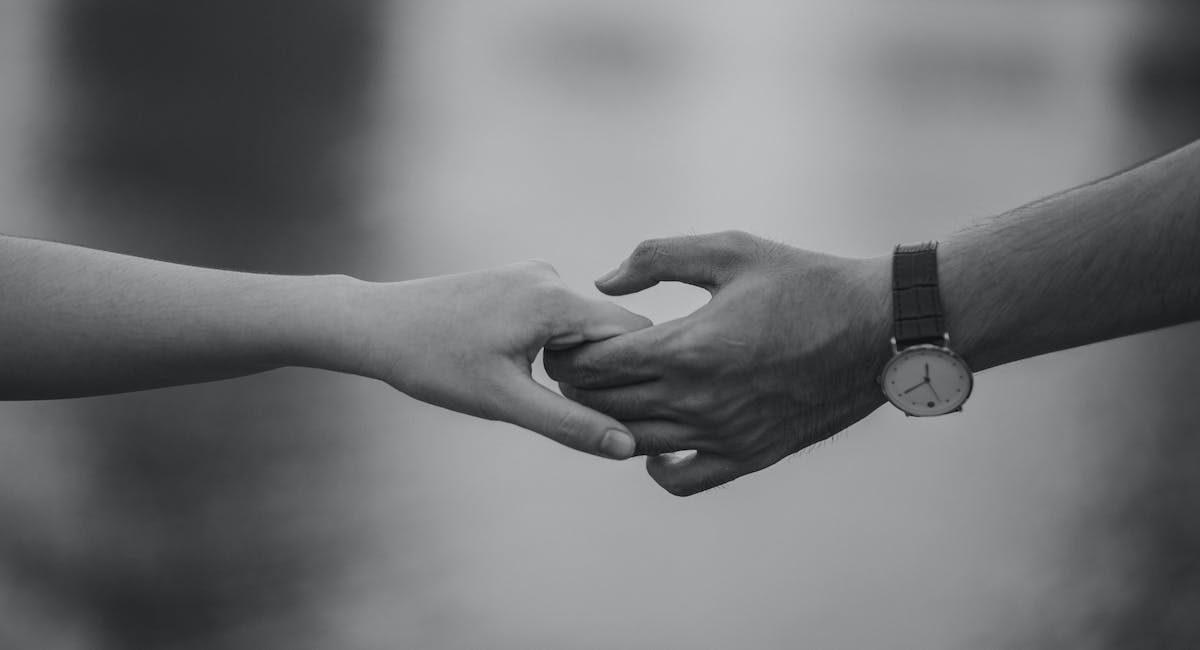
A pilgrim is forbidden from making physical contact with their wife or any other woman while wearing the Ihram clothing. Whether or not ejaculation occurs, passionate touches embraces, or carrying one’s spouse are forbidden and are punished by the offering of a sheep. On the other hand, there is no consequence if these acts are performed without feeling passionate about them.
6- Killing or Hunting Game
While wearing Ihram clothing, a person cannot go hunting or assist a hunter.
Allah says in the Quran:
“O you who believe! Do not kill any game while in (the state of) pilgrim sanctity. And whoever among you kills any (game therein) deliberately, then the compensation (for him) shall be the like of what he has killed in (a charitable sacrifice of) cattle as two just men from among you shall so judge. It shall be (treated as) a charitable offering (of sacrifice to God) brought to the Ka’bah (for the poor). Or, in atonement, (one shall offer its value in) food for the indigent (of the Sacred Precincts); or (one shall) render the equivalent of this (measure) in fasting so that he may taste the grievous consequences of his action. God has pardoned (of this) what has already passed. Yet whoever (willfully) repeats this (violation), God will take vengeance on him. And God is overpowering, all-avenging (of evildoing).” (Quran 5:95)
When a pilgrim performs Hajj tamattu (Umrah performed independently before Hajj), they remain in the condition of Ihram until they have finished the ‘Umrah procedures. On the other hand, individuals who perform the Hajj alone or in conjunction with the ‘Umrah remain in Ihram until the tenth day of Dhul-hijrah.
7- Wearing Sewn Garments by Men
Men are not permitted to wear fully enclosed clothing made of felt or stitches. It is forbidden even to wear sewn shoes to fit the feet. Men must wear shoes with open toes that reveal their toes and the backs of their feet. Men wear an Izaar or other wrap-around garment to hide their Awrah. It is not forbidden to wear a sword or a belt to keep your garments in place.
A pilgrim must intentionally offer a sheep if they knowingly wear anything forbidden while wearing the Ihram clothing. Even if the infraction was accidental, the penalty must be paid out of caution. If these infractions are committed repeatedly, there is a fine for each offense.
8- Niqabs Being Worn by Women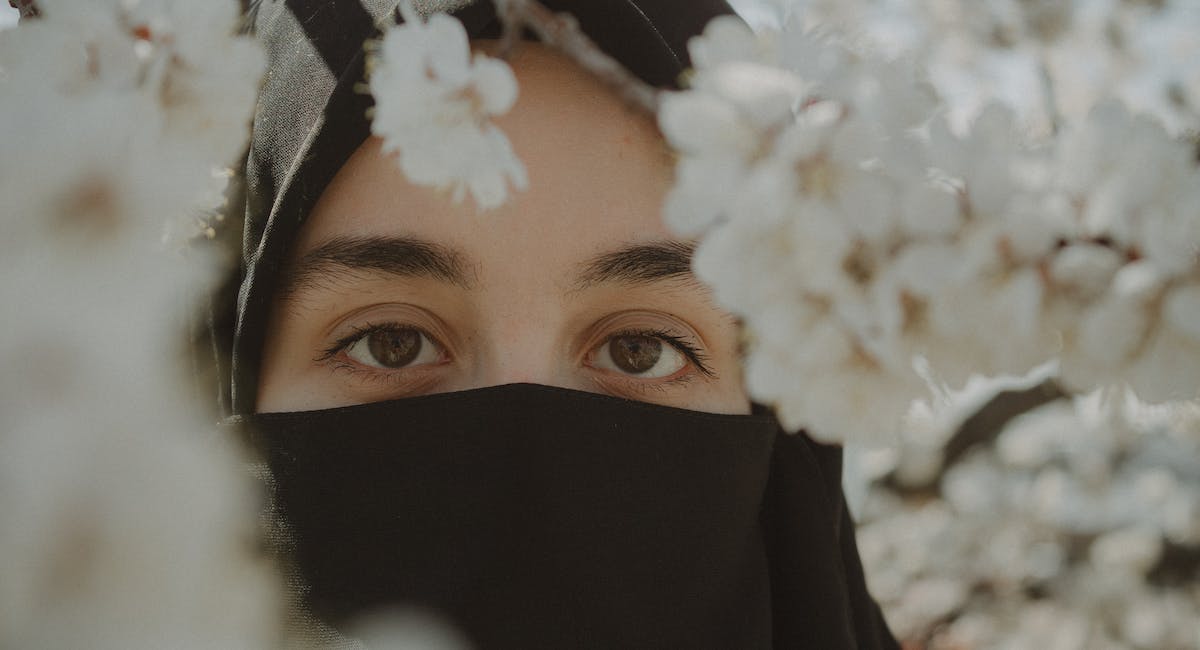
It is forbidden for women to hide their faces with anything that comes into contact with their skin. It is not prohibited if they can hide their face with an object that doesn’t come into contact with their skin. Women are not allowed to wear gloves; however, they are allowed to wear long sleeves that conceal their hands.
While in Ihram clothing, women have the option to cover their faces by pulling the end of their head cover (hijab) from the head down to the nose. As an additional precaution, the kaffarah (penalty) for covering the face is to offer a sheep.
10- Looking in the Mirror for Self Beautification
Pilgrims are forbidden to use a mirror for personal grooming while wearing Ihram clothing. But there’s nothing wrong with using a mirror for other purposes, like a driver looking at his rearview mirror or a pilgrim examining a facial injury.
You regard any reflecting surface the same way you would a mirror. It is advised to replace the Talbiyah if one looks at themselves in the mirror to feel more beautiful. While it is usually accepted to wear medical glasses, it is advisable to avoid doing so if there is a widespread assumption that they are cosmetic goods.
11- Using Oil
It is forbidden for pilgrims to apply oil to their bodies while they are wearing Ihram clothing, even if it is odorless unless it is used urgently or for medical purposes. The punishment for purposefully using scented oil is to offer a sheep. As a precaution, it is advised to feed a poor person as a penalty if it is accidentally administered due to ignorance. However, it is allowed to use unscented oils on the body, bald head, or face.
12- Using Swear Words
According to the Quranic verse, pilgrims are advised to refrain from using offensive language, fights, or ungodly behavior. Disputes are generally discouraged unless they involve promoting righteousness and preventing evil, and even then, they should be done with gentleness, wisdom, and good advice. Engaging in discussions to impart knowledge is encouraged as long as it is done respectfully and gently.
13- Marriage Contract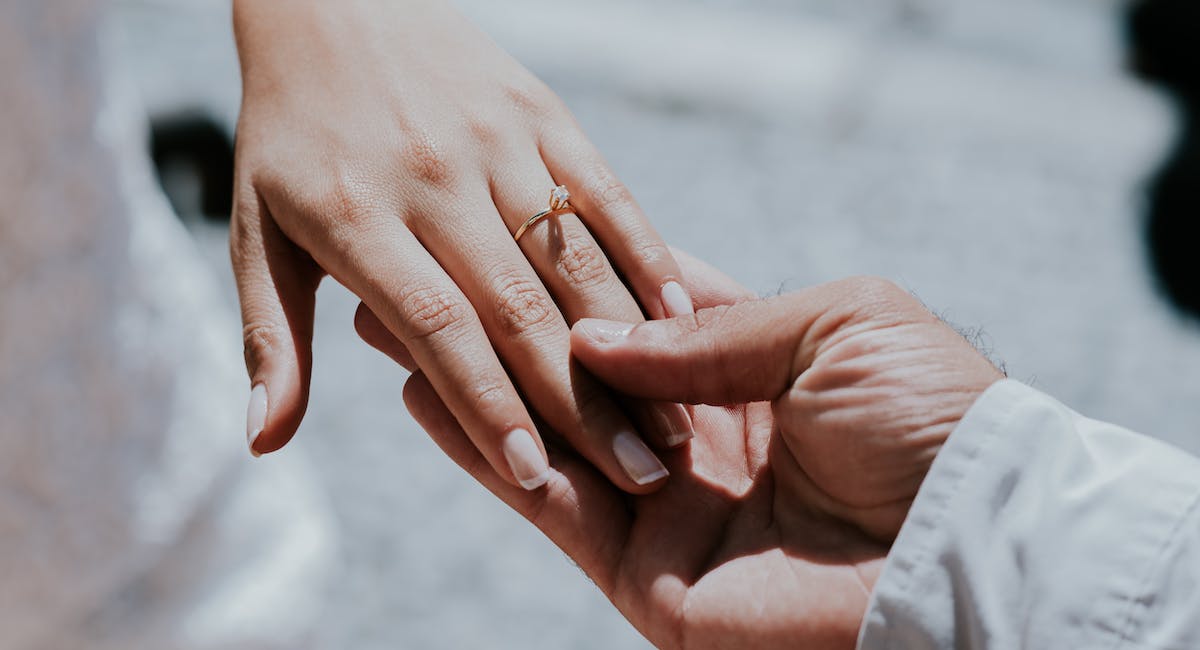
A person cannot discuss these topics, get married, propose marriage, have sex, or have sexual relations with their spouse while they are wearing Ihram clothing. This instruction is in line with the direction provided by Allah.
As Allah says:
The (time-frame of the) Hajj-Pilgrimage falls within the well-known months (at the end of the lunar year). So whoever determines to undertake the Hajj-Pilgrimage therein, then there shall be no sexual relations (rafath), nor ungodliness, nor disputation, during the Hajj-Pilgrimage. (Quran 2:197)
The term “raft” refers to a wide range of behaviors, including acts that may lead to sexual encounters, including kissing or fondling.
Suppose a pilgrim in Ihram marries, and the union is completed. In that case, the ceremony’s officiant and the husband and wife must each pay a penalty of a camel as long as they were informed of the circumstances and the regulations. The uninformed party is exempt from paying the fine if some parties knew and others did not. Whether the woman and the person performing the marriage were wearing ihram clothing or not has no bearing on the severity of the punishment.
Conclusion
In conclusion, upholding the purity of Ihram clothing during the Hajj and Umrah necessitates rigorous obedience to rules emphasizing humility and spiritual focus. These rules based on religious teachings aim to promote an environment of purity and reverence by forbidding everything from marriage to self-care rituals like shaving and wearing Perfume.
Pilgrims need to be mindful of these limitations because willful violations carry fines. Maintaining these values demonstrates a solid dedication to devotion and obedience to Allah’s instructions and ensures a sacred pilgrimage experience.
FAQ’s
What makes Umrah invalid?
A Muslim who is wearing Ihram is not allowed to use any perfumes on their bodies or clothes. A fresh article of iḥrām clothing must be worn to perform the Umrah or Hajj if the robe has been fouled by najas (نَجَس, unclean) material or has been cleaned, rubbed, or touched by scented liquids (intentionally).
What are the rules of Umrah?
Therefore, during the Umrah or Hajj, ladies are allowed to wear clothing with stitching. A woman’s hands and face should be the only exposed parts of her body. All scent-producing products, such as perfumes, deodorants, aftershaves, and scented soaps, are inappropriate for wear by either gender.
What violates Umrah?
Any other kind of ihram violation does not negate the benefits of the Hajj or ‘Umrah. Having sex with one’s spouse renders the Hajj or Umrah void.
Does Hajj remove sins?
The Messenger of Allah (ﷺ) said, “Whoever performs Hajj (pilgrimage) sincerely and does not have sexual relations (with his wife), nor commits sin, nor disputes unjustly (during Hajj), then he returns from Hajj as pure and free from sins as on the day on which his mother gave birth to him.”
If I had my period during Umrah, what would happen?
The umrah ṭawāf must be finished before the sa’y can be performed. Before completing the umrah ṭawāf, a lady who is menstruating is required to wait until her period is over and take a ghusl. She can perform the sa’y but not enter the mosque if her menstruation begins after she completes the umrah ṭawāf.
At Tawaf, are you allowed to wear socks?
The Tawaf should be performed with the right shoulder uncovered. Don’t cover your head or wear underwear, socks, or any other clothing. Put on shoes that expose your toes and ankles.

